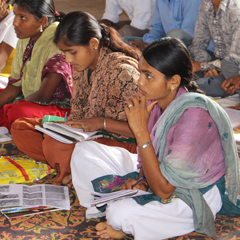-
Grants
31
-
Total Awarded
$19,022,000
-
Years
1989 - 2023
-
Categories
Grants
The Population Council (PC) is an international nonprofit that generates ideas, produces evidence, and designs solutions to improve people’s lives. PC’s research advances global goals related to climate justice, sexual and reproductive health and choices, adolescent empowerment, and gender equality. This awards addresses climate-induced migration within India and globally by promoting equity, resilience, and a just energy transition. It utilizes a diverse consortium and a technical advisory committee to guide research activities and ensures that the resulting evidence informs policy and programming. PC takes a top-down approach by utilizing complex methods to analyze statistical overlaps between climate change and migration, and a bottom-up approach by conducting targeted case studies to understand the drivers, mechanisms, and outcomes of climate-induced migration in India.
Headquartered in New York City and with 14 international offices, the Population Council (the Council) conducts policy-relevant research and designs and tests innovative models to improve sexual and reproductive health around the world. With general support from MacArthur, the Council advances work on its new Strategic Priorities Framework to achieve its mission to improve the well-being of current and future generations, and help achieve a sustainable balance between people and resources. The award supports the Council to invest in priority areas in sexual and reproductive health, where evidence will yield the greatest policy impact.
Founded in 1952, the Population Council, an international non-profit research organization, seeks to improve the well-being and reproductive health of current and future generations and help achieve a humane, equitable, and sustainable balance between people and resources. This award supports a program of work that seeks to deepen the knowledge of maternal and newborn health in India through in-depth analyses of various data sets; build capacity to support a new generation of maternal health researchers; and disseminate the knowledge generated to advocate for increased investments and changes in maternal health policy and programs in India.
Founded in 1952, Population Council is a global organization that has had an office in Nigeria since the 1960s. The Council has been instrumental in the design of reproductive health products (especially contraceptives), service delivery programs, and making public policies responsive to the reproductive health needs of people in developing countries, including Nigeria. Through a previous Foundation award, Population Council trained and mentored health care providers in Kano state on the early detection and treatment of pre-eclampsia and eclampsia using magnesium sulfate and piloted task-shifting to community health extension workers. Population Council is currently working in Katsina state with Foundation support to replicate the successes achieved in Kano state. In this project the organization is working to institutionalize the applications of magnesium sulfate for the treatment of pre-eclampsia and eclampsia in Kano and Katsina states.
The Population Council is a global organization that has had an office in Mexico since 1979; its research on reproductive and sexual health issues produces evidence for planning effective interventions. The Council is studying how women-centered maternal health care is being taken up in the Mexican private health and education sectors. Through desk research, site visits, and interviews, the Council is mapping how the model of maternal health care is changing within the private sector and whether this has the potential to influence broader changes in maternal health care.
The Population Council, along with local partner organizations, will design, pilot and test an intervention in the state of Gujarat in India that seeks to increase girls’ transition to secondary education and improve learning outcomes through a program of mobilizing parents and communities using public campaigns and mobile phone technology.
The Population Council conducts policy-relevant research and designs and tests innovative models to improve sexual and reproductive health (SRH) around the world. Council staff will carry out a varied package of action and policy research to generate new evidence about maternal and reproductive health.
Population Council staff will work with the United Nations High Commission on Refugees (UNHCR) to test models offering comprehensive responses to sexual violence in conflict, post-conflict, and refugee settings. The results will be used to inform UNHCR’s strategy against sexual and gender-based violence.
This grant will allow the Population Council to add a greater focus on reproductive health to its program of action-research, or “operations research,” aimed at increasing the evidence about what works to improve the lives and health of adolescent girls in the global South. In addition, the Council will update a monograph on addressing the needs of adolescents aged 10-14, and will disseminate the resulting product through events and social media.
The Population Council, along with local partner organizations, will design, pilot and test an intervention in the state of Gujarat in India that seeks to increase girls’ transition to secondary education and improve learning outcomes through a program of mobilizing parents and communities using public campaigns and mobile phone technology.
The Population Council proposes research that focuses on enabling a better understanding of the determinants of sexual and reproductive health behaviors and practices that take place among young people as they transition into adulthood. The project builds on data and insights obtained from a research project previously conducted by the International Institute for Population Sciences and the Population Council, namely, the “Youth in India: Situation and Needs” study. This follow-up survey, which will be conducted in the state of Rajasthan, seeks to provide more evidence-based lessons for programs and policies intended to advance young people's sexual and reproductive health and rights.
To advance maternal and young people's reproductive health in India, Nigeria, Mexico, and globally (over three years).
To support a pilot project to address postpartum hemorrhage at the community level in the Amhara region of Ethiopia (over two years).
In support of research, evidence-based interventions, and policy activities on maternal mortality and young people's sexual and reproductive health and rights in India, Mexico, Nigeria and globally (over three years).
To support The Protective Role of Education in Humanitarian Emergencies project (over two years).
In support of a program to develop leadership skills of individuals working in reproductive and sexual health, especially in areas of young people and maternal mortality and morbidity in India.
To establish a web-based Arabic language resource and documentation center in population and reproductive health (over two years).
In support of programs on reducing maternal mortality and advancing young people's reproductive health in Mexico, India, and globally (over three years).
In support of Arabic translation and web-based distribution of key Council documents in population and reproductive health.
In support of a program to develop leadership skills of individuals working in reproductive and sexual health, especially in areas of young people and maternal mortality and morbidity in India (over two years).
For a project to share international expertise on maternal mortality reduction with relevant Mexican government officials (over eight months).
In support of an endowment for the Policy Research Division.
To conduct research on married adolescents in northern Nigeria.
In support of a program to develop the leadership skills of individuals working in reproductive health and sexual rights in India.
To support research, technical assistance, and policy advocacy on safe motherhood and other reproductive health issues, with a special focus on Mexico (over three years).
To support the Robert H. Ebert Program on Critical Issues in Reproductive Health (over three years).
To support programs that address reproductive health and rights (over three years).
To support a program in Mexico on the interaction between men, families, and reproductive health (over three years).
For a meeting of the International Advisory Group of the Population Program.
To support the Robert H. Ebert Program on Critical Issues in Reproductive Health (over three years).
To support the Robert H. Ebert Program on Critical Issues in Reproductive Health (over three years).







